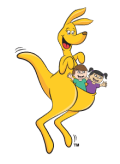Lyn Jarvis and Dr Tessa Grigg
Every parent wants to give their child the best start to school, but we often get caught up with rote learning of numbers, colours, letters and shapes, hoping this will give our child a step-up on the way to formal education. It is more valuable however, to know that your child’s brain and body are ready to learn. At GymbaROO-KindyROO we hold specialist classes to ensure your child will have the best possible beginning to school life.
Both physically and neurologically, our bodies and brains need to be ready to learn. For example, writing involves a lot more than holding a pencil and copying a letter. To be ready to write easily children need to have the following:
• Good tactile and body awareness so they can control their fingers automatically.
• Posture and balance developed to the extent that they can sit still easily and concentrate on their work.
• Auditory perception and processing skills so they understand the instructions given by their teacher.
• The ability to move their eyes smoothly from what they are copying to what they are writing.
• The ability to ‘picture’ the letters they are writing in their mind (visualisation).
• The fine motor skill to manipulate the paper and pencil.
• The hand-eye coordination to write correctly what their eyes have seen.
• Temporal awareness, an internal understanding of time, to be able to do the allotted task in the time allocated.
When all of this is in place, our children can easily take on the task of writing. However, if one or more of these factors are not fully developed, then a child may potentially struggle with the writing tasks at school.
Lots of movement experiences give us an internal awareness of both sides of the body. This allows children to move all their body parts independently of each other, crucial to managing in a classroom environment. By school entry, children should have a preferred hand firmly established and be able to cross their midlines. Parents may not be aware that young children have a midline – an ‘invisible line’ down the middle of their bodies, from their heads to their toes. Children need to be able to cross over this midline easily with arms, legs and eyes without twisting their bodies or heads. This ability to cross the midline repeatedly and without difficulty indicates that children are lateralised and are ready for higher-order cognitive thinking. This is crucial for success at school and sport.
Children who are not fully lateralised by school age are at risk for learning difficulties. If their eyes do not cross smoothly across the midline, they cannot easily follow words across a page without losing their place, leading to reading difficulties. Writing will also be problematic, as their preferred hand will not cross fluently from one side of their body to the other. This will result in children twisting their paper and sitting awkwardly to avoid crossing the midline, or instead swapping the pencil from one hand to the other as they reach the middle of the page.
Not being lateralised will also affect their physical prowess and sporting ability. Cross pattern movements – movements that involve crossing the midline and the two sides of the body working well both individually and in unison – will be jerky and uncoordinated and balls skills a nightmare.
At GymbaROO-KindyROO, every activity in the School Readiness classes is carefully planned to ensure children have the best skills in place to start school. We practice auditory processing skills, visual skills, word recognition and word games, finger and body awareness, motor planning, laterality, temporal awareness, sequencing and directionality, gross and fine motor activities, cross pattern movements, balance and posture – all while we are having fun dancing, singing, spinning, swinging, tumbling, jumping, balancing and laughing!
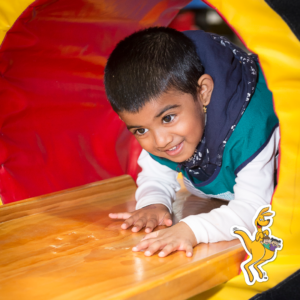
Here is a brief checklist of skills required for school
Personal/Social Skills
• Adapts to unfamiliar settings and new experiences.
• Can finish a task, and tidy up afterwards.
• Plays cooperatively with other children (shares and takes turns).
• Can separate from parents.
• Can cope with criticism and some frustration without becoming upset.
• Is responsible for own belongings.
• Can sit still and listen.
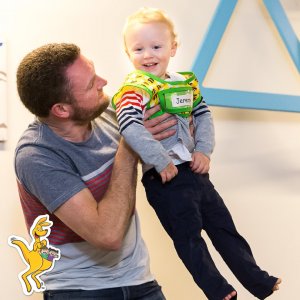 Language
Language
• Talks to other people about familiar objects and events.
• Can speak in full sentences which are grammatically correct.
• Has a fairly wide vocabulary and can pronounce words clearly.
• Answers and asks simple questions.
• Makes needs known.
• Follow a sequence of three instructions (minimum): e.g. put your pencil beside your book, stand up and wait until I tell you to line up for recess.
• Uses books for enjoyment and for looking at pictures.
• Can repeat several nursery rhymes and tell stories.
• Can make up a story from looking at pictures.
• Can identify the beginning, middle and end of a simple story.
• Joins in singing familiar songs.
• Recognises own name when written and understands that written symbols have meaning.
• Can distinguish between sounds that are nearly the same.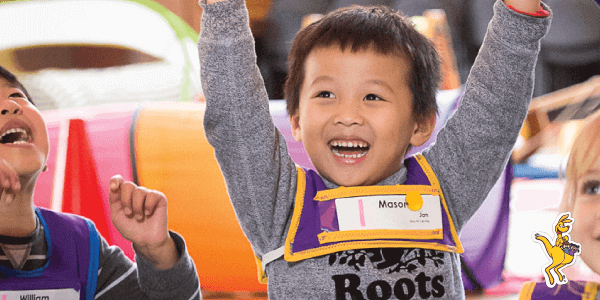
Gross and Fine Motor Skills
• Has a preferred hand for skilled tasks.
• Can jump with two feet together; forwards, backwards and sideways.
• Can balance on one foot and count to ten.
• Can hop on each foot and can skip along.
• Has good body control in running with a cross pattern action.
• Is able to march automatically with a cross pattern action and therefore able to move and think at the same time. This is necessary to carry out verbal instructions while moving.
• Can walk up and down stairs using alternate feet without holding on.
• Can throw, catch and kick a ball with a cross pattern action.
• Can climb confidently on outdoor equipment.
• Is aware of all fingers and can use them independently.
• Can follow a figure eight pattern with eyes teamed (without moving head).
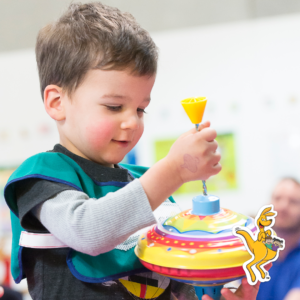 Cognitive Skills
Cognitive Skills
• Has an internal awareness of two sides of the body and be able to move them independently of each other.
• Can draw a person with head, legs, trunk, arms and fingers. This needs to come from the child’s internal awareness of the body, not be taught by an adult.
• Can draw a recognisable house or such-like spontaneously.
• Can name drawings before doing them.
• Ability to copy a cross, square, V H T O.
• Can name colours, can count items 1-20, can name shapes.
• Can identify which picture is different in a pattern.
• Understands direction concepts of up, down, across, behind, forwards, backwards, etc.
It is important to realise that children without the above skills will still learn. However, children who cannot do a number of the above tasks at school entry are at risk for learning difficulties. Knowing colours and numbers is not enough. Children need to be able to think and move at the same time by ensuring they have good balance and coordination. They need to have practiced visual and listening skills, be able to sit still and concentrate, and enjoy facing new challenges. For our children to start school as confident capable learners they need to have both their bodies and their brains ready to learn.
Lyn Jarvis is a qualified GymbaROO Early Childhood Neuro Physiological Development Consultant.
References:
1.NSW Dept. Education & Training: Beginning at a Public School.
2.Toddler Kindy GymbaROO: 4 Year Olds – to School Next Year?

